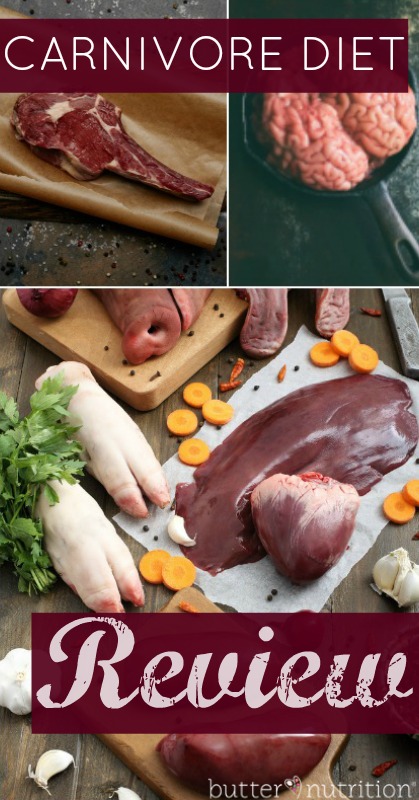 One of the most common questions I get asked is my opinion on various diets, so I've decided to do a little diet review series to help those interested readers get more information on diets they may be considering.
One of the most common questions I get asked is my opinion on various diets, so I've decided to do a little diet review series to help those interested readers get more information on diets they may be considering.
Next up is the Carnivore Diet review...
Before we get started today, I just want to remind you that diets can really fool you. They often make you feel great in the short-term (first few months up to a year), but then typically things really start to deteriorate, so always keep this in mind when you are hearing about these kinds of diets on social media. We are looking for widespread long-term data, not short-term results...
Time to get on learning all about the Carnivore Diet, a diet that no cultures around the world eat on purpose (unless there is little to no vegetation available) ...
Carnivore Diet Angle:
The Carnivore Diet is deeply rooted in relying only on animals for all of your nutrition needs.
What does the Carnivore Diet boil down to in practice? It's actually pretty simple. Typically, the diet is based around the following foods:
- animals and all of their parts: muscle meats, organ meats, fish, seafood, eggs, collagen, etc. If it's from an animal, it's on the menu, with the exception of dairy products.
By eating just animals, you get a wide variety of nutrients in the most bio-available form. You also avoid processed foods, all of the common food allergens and plant toxins. Sounds great in theory - but it's also incredibly limiting.
Carnivore Diet Reality:
The Carnivore Diet reality is an interesting one. It takes a very historic and ancestral way of eating and tries to apply it to modern times. What's wrong with that statement? Well, firstly, we live in a very different time and space now. I don't believe you can eat like hunter gatherer if you're not living like one too. The diet is just not very compatible with modern life. I mean, if you're relying on getting your food from only animals (which do contain a wide variety of bio-available nutrients if you eat the whole thing - and I mean everything), it's incredibly hard to do in our common day unless you are hunting and butchering the animal yourself.
How else are you going to get the blood, brain, intestines, heart, kidneys, and all the other things that the typical American has never consumed?
Sure, there are supplements like organ glandulars that can help, but they're only doing part of the job. They still will never reflect eating the animal in the same ratios that you would if you were relying on each and every part of it for survival. It's a flawed concept that perhaps only a small percentage of the Carnivore Diet community could actually execute well.
It's also a risky diet in which you bypass all your instinctual eating habits and cravings up to this point in your life for the external programming of just eating meat (and the fat attached to it).
Can you imagine walking through a berry field or apple orchard at the height of the season and ignoring your body's desire to consume fruit at peak ripeness?
One of the questions I always ask myself when I'm evaluating a diet of any kind is, is the long-term research sound enough on the benefits and well-roundedness of this diet that we would advocate and trust it with a developing child under the age of four?
And then there's the Inuit people who do eat a Carnivore Diet or about as close as you'd come, and they eat that way because lush plant food is not available to them. Do you really want to eat a way that is reserved for .5% of the globe (totally guessing on the math there, sorry). And even further, how would your body, and your genetic makeup interpret such a drastic dietary change? I would vouch it could be seen as very severe environmental stress by the body which could trigger a chain of genetic changes...
Carnivore Diet Positives:
The soul of this dietary paradigm has many upsides, namely:
- emphasis on nose to tail eating or eating the whole animal which offers a variety of nutrients in a very bio-available form
- focus on sustainably raised animals + seafood
- may have a therapeutic purpose in alleviating disease symptoms, which may or may not have something to do with eliminating virtually all common food allergens
- avoids plant toxins
Let's dive into plant toxins a little more. Plants naturally produce plant toxins as a defense mechanism. It helps keep them from being eaten and helps them to grow and prosper as a plant species. Plants are constantly evolving their own protection the keep them alive (but then again so are humans, through epigenetics)...
What's interesting about plant toxins, is that plants often contain nutrients like vitamin C [3] that can actually help human tolerance to plant toxins, so it's a complex argument without a clear net loss/gain conclusion.
Carnivore Diet Negatives:
Here's a few negatives of the Carnivore Diet to keep in mind:
- extremely restrictive diet
- electrolyte imbalances are common, specifically from a loss of sodium, potassium and magnesium (think heart palpitations, muscle cramps, constipation and feeling dizzy or weak)
- high iron diet, could be catastrophic for those with iron overload disorders
- excludes fruit (which is also pretty low in plant toxins but super high in nutrients)
- social suicide, extremely isolating way to eat
- if liver is overemphasized and not balanced by other organ meats, especially intestines, heart, and brain, it could result in too much iron and/or vitamin A being consumed.
- is a huge de-evolution of our eating habits, which may stress evolved genetics
- your grandparents, great-grandparents, or even great-great grandparents did not eat this way
- avoids plant toxins which may have some benefit via hormesis [2]
- eliminates season food varieties that have defined eating habits since the beginning of time
- banishes all carbohydrates from your diet which can cause serious issues
- causes you to tune out what your body may be craving or asking for in place of dietary dogma (this can cause the body to shift out of homeostasis)
- risk of "over nutrition" or nutrient excess due to the on demand availability of any part of the animal. On the modern Carnivore Diet you're not typically hunting and eating the animal in entirety, there's a risk of overdosing on incredibly nutrient dense parts of the animal, especially liver (very high in iron and vitamin A, both subject to toxicity) and spleen which is high in iron. This could also be exacerbated by additional supplementation on such a diet.
Better Options and Things to Consider Before Going on Carnivore Diet:
My philosophy as a nutritional therapist is never to tell anyone what to do. Instead, I prefer to help provide information and an opinion based on my work with clients and what I see every day in my practice. That way, you can feel empowered to make the best decision for you.
Here's a few suggestions of things to explore before going on the Carnivore Diet:
- If you're looking to get some of the benefits of the Carnivore Diet without the extreme dietary undertaking, focus on adapting more "whole animal" foods in your diet that help fill in those missing in the standard American diet. Collagen and a low dose organ complex are a good place to start.
- Make sure you understand and address underlying reasons for thyroid health, hormone, metabolism and energy problems before taking an extreme diet approach. The opposite of dieting approach and the Personal Nutrition Assessment are easy ways to get started with understanding your body from the inside out!
- Instead of drastically changing your diet overnight, learn about why you are experiences issues that are driving you to pursue a carnivore diet to begin with. GI Map testing can be incredibly helpful for this.
- Consider testing to discover if your nutrient excesses and deficiencies are influencing your health and work on correcting them. Hair Analysis is my favorite tool for this.
- Research cultures and groups that eat this way and have for a long time. Short-term benefits are great, but it's the long-term impact and the sustainability of the diet that's most important.
- Think hard about if this is a diet you can actually stay on for the long term. If not, it could cause a lot of undue stress to your body.
And, if you need help evaluating any health trend, ask yourself these 4 questions to avoid going down a road that could take you away from health and homeostasis:
- Does it suggest you spend a lot of money on something other than high quality nutrient dense food?
- Does it tell you to ignore what your body is telling you in order to adhere to the "program": ie. cravings, hunger, thirst, fatigue, etc.?
- Does the program stress buying food or supplement items that your great grandmother would not recognize?
- Does it promise a "quick fix" or overnight results?
(hint: The Carnivore Diet really breaks #2, so I just can't recommend it to anyone.)
Bottom line: Incorporating some carnivore-style eating into your life is a good thing. Just don't do it to the exclusion of everything else nature has to offer your body. I stand by my full-fledged opinion that the healthiest diets are those that include the widest variety of foods (therefore nutrients) without any sort of restriction. That way, your body can seasonally guide you to the nutrients it craves.
I hope you enjoyed this review of the Carnivore Diet. Don't forget to check out the others in the diet review series.
Have you tried the Carnivore Diet? If so, how did it go for you? Please share in the comments!
PIN IT:
References:
- Byproduct of running a nutrition practice for 8 years and talking with hundreds of women from all over the world.
- https://www.ncbi.nlm.nih.gov/pmc/articles/PMC2248601/
- https://www.ncbi.nlm.nih.gov/pmc/articles/PMC3660703/
- https://drcate.com/going-low-carb-too-fast-may-trigger-thyroid-troubles-and-hormone-imbalance/








Sheila says
Nice post.
Michelle says
I was 100% into the carnivore diet and believed it wholeheartedly because everyone else on social media was experiencing supposedly tremendous results. And they all say, “the cravings go away” if you keep doing it. Well for me they never went away no matter how strict I was. It felt counterintuitive and like I was ignoring my intuition. Now I’m on a more intuitive eating path. I also feel like other carnivore dieters actually do have those cravings deep down but that they are just better at turning off their intuition and ignoring the cravings because they think it’s for their own good. And I know the Inuits eat only meat and have straight teeth but many people forget or don’t take into account their much shorter life span.
Bouncedancer says
In the late 1980s I had the great good fortune to get to work with an expert in food allergies, who put me on a 4-day rotation diet. When he looked at my food record, he was amazed to see that whole days would go by without me eating protein.
He had to train me to embrace meats. He instructed me to draw the boundaries on a plate with a crayon: 50% meats/fish/eggs, 30% veggies, 10% fruit and 10% nuts/seeds. Now doesn't that sound like the perfect diet? It was for me -- excess weight came off at a pound a day, and all symptoms of allergies to pollen and animals immediately disappeared, as well as skin issues and hemorrhoids.
Still, it took me 30 years to come to terms with what I learned, till my body had me cornered. My programming to eat the way I had been was so strong that it took hypnosis to retrain me towards the way I had learned works for my body
Amy says
Thanks for sharing your experience!
Michael Haire says
Carnivore is not a diet, it is an elimination protocol. Have some taken extreme measures, yes. I went Carnivore for four weeks and it completely helped me. I was Previously lactose intolerant and egg white intolerant; not after carnivore. Yes, I was tested. Carnivore is a way to eliminate plants and other toxins as meat is very bio available and the colonoscopy folks never find any meat, only plants (perhaps because we cannot digest fiber). The answer is the PHD, perfect health diet. One person wrote in already talking about 50% of the plate protein and that is similar. An active person needs 30% of calories from meat, 45-50% of calories from fat, and 20-25% of calories from carbs (not sugar or refined grains. Steer clear of sugar and table salt, and seed oil, and refined/enriched grains. Natural is better. Make your own food and plan the meal around protein and fat. Finish it with veggies your body can handle (preferably grown by you) and seasonal fruit if you want it. Fruit today is not what our ancestors ate, todays fruit is bastardized and vastly different and sweeter. Fruit from 100 plus years ago was riddled with seeds and way less sweet. Stay way from soda as well. Your info on carnivore is out of date, I did it a year ago and electrolytes were a major teaching point. Carnivores are told to us a high quality salt, like Redmond’s, and to make your own beef broth. Both supply plenty of electrolytes. Additionally, since they are not eating the sad, the SAD RDA is not needed. The worse thing that happened to me was on my last week, I became very dry despite drinking a lot of water. Mouth, nose, and eyes were dry and nothing quenches my thirst, except coffee. Once I added Some carbs in the form of veggies and or fruit or real honey, I was fine. Now, one year later, animal protein is my main source of food and I eat some fermented cabbage, some veggies my body can handle, and a very small bit of wild fruit. Each person is different and has to find what works for their body; there is NO cookie cutter method that works for all.